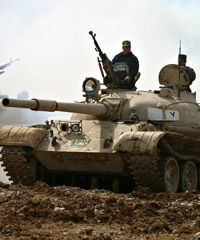
April 30, 2008 | Author: Greg Bruno
In March, despite few signs of progress on an Iraqi national oil law, the Kurdistan Regional Government’s Ministry of Natural Resources readied for a hiring spree. Calls went out for legal advisors, engineers, and geoscientists—"thirty-five oil and gas experts in all.

At the time the job postings seemed like wishful thinking; Baghdad and Irbil, capital of the Kurdish autonomous region, appeared sharply divided on how to develop the region’s massive oil wealth. But one month later, the want ads appear to have been a harbinger for warming relations between the Shiite-dominated central government and the northern Kurdish region. Iraq’s chief government spokesman has hinted that a national oil agreement is imminent (UPI), and an Iraqi paper reports “major concessions” (Azzaman) have been reached.
Diplomatic breakthroughs have been rare on chief issues dividing Iraqi Kurds and Shiite parties in parliament. The regional government’s practice of signing oil contracts with more than a dozen international firms irked central government leaders, and sparked warnings from some analysts that Kurdistan had “overreached” in its ambitions (NYT). Parliament’s stonewalling of funds for the autonomous region’s peshmerga security forces also frustrated Kurdish officials. Qassim Dawd, an Iraqi parliamentarian and member of Prime Minister Nouri al-Maliki’s party, said in January the disagreements had produced “ups and downs and mistrust between the two sides” (IWPR).
But there are signs regional relations are on an upswing. On April 12, Maliki agreed that Kurdistan’s regional security forces “have the cover of legitimacy” (AP) and will be organized within two Iraqi army divisions of up to thirty thousand troops. The decision came amid a Maliki-led crackdown on militia groups elsewhere in Iraq. In a statement issued April 22 after meetings with central government leaders in Baghdad, Kurdish Prime Minister Nechirvan Barzani said he was “very optimistic” about recent diplomatic gains—"including talks on the status of the city of Kirkuk. U.S. policymakers, too, have trumpeted recent developments. Secretary of State Condoleezza Rice, en route to Baghdad on April 20, praised the Iraqis’ crackdown on Shiite militia groups for “coalescing” Sunni, Shiite, and Kurdish interests.
On the oil front, accounts differ as to how close the central government and Kurds are to a formal agreement. Talks are said to be focusing on how to implement a draft oil law (PDF) from February 2007. Reports of a breakthrough sent shares in Norwegian oil and gas producer DNO soaring on April 16. The Norway-based company is one of at least twenty firms to have signed production-sharing deals with the Kurdish government. Barzani said he was confident such deals will eventually be honored. But there are significant hurdles to finalizing a national oil law, as this Backgrounder explains. Iraq’s oil minister, who has in the past vowed to invalidate oil development contracts signed between Kurdistan and foreign firms, reiterated his opposition (AP) on April 21, though he did say talks are continuing.
Kirkuk may turn out to be the thorniest issue to resolve, according to the Economist. Kurds see the city as their ancient capital, but Arabs forced to relocate there under Saddam Hussein want Kirkuk to stay under the authority of Baghdad. A vote on its status is scheduled for the end of June. But a senior representative of the UN Secretariat, which brokered an extension to the referendum in December 2007, now believes the only solution to the Kirkuk problem is a political one, which could prove difficult to broker. “The last thing Iraq needs is a conflict about Kirkuk,” UN Iraqi envoy


